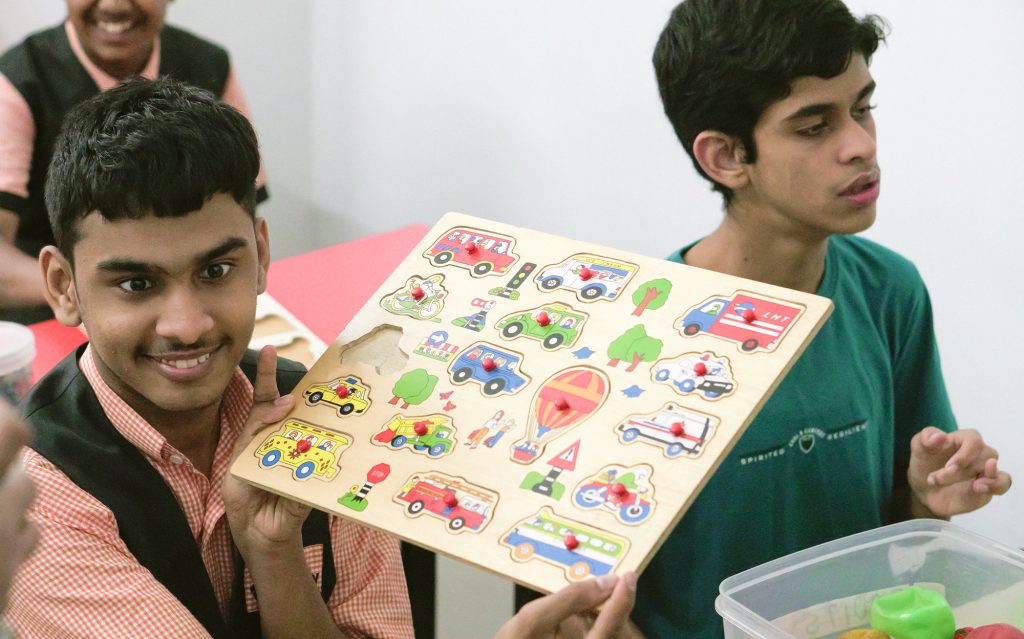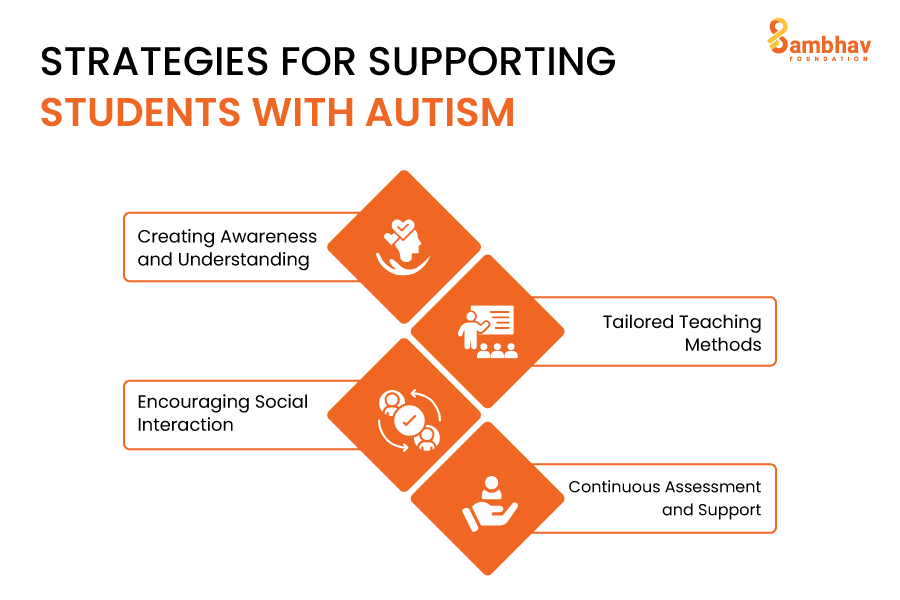Inclusive Education in India
Embracing Change: Navigating the Path to Inclusive Education in India
India’s educational landscape is experiencing a transformative shift, with a growing focus on inclusive education for students with disabilities. This transition is particularly vital for students with autism, necessitating a compassionate and accommodating learning environment. As we go further into the present state of inclusive education and its varied implementations, this blog aims to shed light on the unique challenges and opportunities that this journey presents.
We explore how different environments critically influence the learning experiences of students with autism, striving to create a culture of inclusivity and bridge knowledge gaps. Emphasising the need to adapt educational practices for all learners sets the stage for an in-depth discussion on the societal, educational, and policy-level contributions required to foster a more inclusive educational landscape in India.
Autism in India
Unravelling the Spectrum for Inclusive Learning
Autism is the world’s third most common developmental disability, a neurological illness that usually manifests by the age of three. In India, it is estimated that around 18 million people have Autism.
Defining Autism Spectrum Disorder
Autism Spectrum Disorder (ASD) is a complex neurodevelopmental condition characterised by varying degrees of social interaction difficulties, communication challenges, and repetitive behaviours. The ‘spectrum’ in ASD highlights the wide range of symptoms and skills individuals with autism may exhibit. Some may lead largely independent lives, while others might require significant support. Understanding the multifaceted nature of autism is the first step towards fostering inclusive education for these students.
Recognizing the Signs and Symptoms
Early identification and intervention are pivotal in supporting individuals with autism. Common signs include difficulties in social interaction, challenges in verbal and non-verbal communication, and repetitive behaviours. However, the manifestation of these symptoms can vary significantly, necessitating a personalised approach to education and support. There are some NGOs that help with early diagnosis and intervention.
The Role of Early Diagnosis and Intervention
Timely diagnosis and intervention can lead to markedly better outcomes for individuals with autism. Early educational programs, tailored to meet the unique needs of each student, play a critical role in their development. Emphasising the importance of inclusive education for students with disabilities, specifically autism, becomes imperative in this context.
Autism and Its Co-occurring Conditions
Individuals with autism may also experience co-occurring conditions such as ADHD, anxiety, or learning disabilities. Understanding these concurrent conditions is essential for developing comprehensive educational strategies. This ensures that every aspect of the student’s development is addressed, aligning with the ideals of inclusive education.
The Spectrum of Abilities
Autism encompasses a broad spectrum of abilities. Some individuals might excel in areas such as maths, art, or memory, showcasing extraordinary talents. Recognizing and nurturing these strengths is a crucial component of inclusive education, as it ensures that students with autism receive the support they need to thrive.
Shaping Futures: Cultivating Supportive Environments for Autism
The Home Environment
The home environment plays a crucial role in shaping the development of individuals with autism. A stable and supportive home can significantly enhance their learning and developmental outcomes. Families are encouraged to create a structured environment, fostering a sense of security and routine, which is often beneficial for children with autism. Additionally, parents and siblings play a vital role in providing emotional support and understanding, crucial for their overall development.
The School Setting
Inclusive education for students with disabilities necessitates a supportive and accommodating school environment. Special education programs in India are increasingly adopting inclusive practices, integrating students with autism into mainstream classrooms while providing necessary support. Teachers trained in inclusive education strategies can make a significant difference, adapting their teaching methods to accommodate diverse learning needs. Furthermore, a positive and inclusive classroom culture encourages peer support, enhancing the social development of students with autism. As per UDISE + 2021-22, there are about 22,66,794 children with special needs (CWSN) students enrolled from pre-primary to class XII.
The Community and Beyond
Beyond the confines of home and school, the broader community plays an integral role in the lives of individuals with autism. Public spaces, social gatherings, and extracurricular activities provide opportunities for social interaction and skill development. Communities that embrace inclusivity contribute to the normalisation of autism, fostering a sense of belonging and acceptance.
The Virtual Environment
In today’s digital age, the virtual environment is an increasingly prevalent aspect of our lives. For individuals with autism, technology can offer alternative means of communication and learning. Educational apps and online resources tailored for students with disabilities can provide additional support, complementing traditional learning methods. However, it is crucial to navigate the virtual space mindfully, ensuring that it remains a positive and supportive environment.
The Impact of Environmental Adaptations
Adapting various environments to suit the needs of individuals with autism can have a profound impact on their development. Simple modifications, such as reducing sensory stimuli in a classroom or providing clear visual cues, can make a world of difference. Emphasising the importance of these adaptations underscores the foundation’s commitment to inclusive education and the betterment of education for disabled students.
By examining how different environments influence the development of individuals with autism, this section sheds light on the importance of a supportive and inclusive approach across various aspects of life. Creating adaptive and understanding environments is crucial in fostering positive learning and developmental trajectories for individuals with autism.
The Transformative Journey of Inclusive Education for Autism
Defining Inclusive Education
Inclusive education is a pedagogical approach that advocates for the integration of students with disabilities, including autism, into mainstream classrooms. This method emphasises providing equal learning opportunities, tailored support, and a nurturing environment to all students, regardless of their abilities or disabilities. The principle behind inclusive education aligns with the broader goals of creating a more equitable and just society, ensuring education for disabled students is prioritised and optimised.
Benefits of Inclusive Education for Autism
Students with autism stand to gain significantly from inclusive educational settings. These environments offer diverse social interactions, facilitating better communication and interpersonal skills. Inclusive classrooms also expose students with autism to various learning styles and perspectives, enhancing their cognitive development and academic performance. Furthermore, being part of a supportive community within the school helps in fostering self-esteem and a sense of belonging, crucial for the emotional well-being of students with autism.
The Role of Teachers and Educators
Teachers play a pivotal role in the successful implementation of inclusive education. Special education in India is evolving, with more educators receiving training in inclusive teaching methods and strategies. These trained professionals are equipped to adapt their teaching styles to meet the diverse needs of their students, creating a more conducive learning environment. Their role extends beyond academic support, as they also provide emotional and social guidance, helping students with autism navigate the complexities of the classroom setting.
Challenges and Solutions
While inclusive education holds great potential, it is not without its challenges. Limited resources, inadequate training, and prevailing stigmas around autism can hinder the effectiveness of inclusive practices. Addressing these challenges requires concerted efforts from educators, policymakers, and communities. Investing in training programs, increasing awareness, and fostering a culture of acceptance and support are crucial steps toward creating an inclusive education system that truly benefits students with autism.
Empowering Intellectually Challenged Learners: A Step Towards Inclusion
Saadhya School’s Impactful Journey
Within the narrative of promoting comprehensive health and empowerment, it is crucial to shed light on the educational strides being made for intellectually challenged learners. Sambhav Foundation’s initiative Saadhya School stands as a beacon of hope and progress in this domain, passionately dedicated to the holistic development of students with intellectual disabilities.

The Tangible Impact:
The impact of Saadhya School’s efforts is both profound and uplifting. Having extended its support to over 90 students, the school has been instrumental in cultivating a balanced and inclusive learning environment. This includes nurturing the growth of 30% female and 55% male students, reflecting the school’s commitment to gender inclusivity. Through its dedicated programs, these young individuals have blossomed into confident adults, equipped with vital skills that empower them to earn a living and lead fulfilling lives.
Saadhya School’s journey is not just about education; it’s about transforming lives and breaking down barriers. By providing intellectually challenged learners with the tools and confidence they need, the school plays a crucial role in creating a more inclusive society, where every individual has the opportunity to thrive.
Empowering Every Learner: Practical Strategies for Fostering Inclusivity in Schools

Creating Awareness and Understanding
Promoting inclusivity begins with fostering awareness and understanding among students, teachers, and staff about autism and the importance of inclusive education. Schools should organise workshops, seminars, and training sessions to educate stakeholders about the diverse needs of students with disabilities and the benefits of an inclusive environment. This knowledge helps in breaking down stereotypes and prejudices, creating a more accepting and supportive school culture.
Tailored Teaching Methods
Implementing teaching methods that cater to the diverse needs of all students is crucial. Educators should be trained in differentiated instruction, allowing them to adapt their teaching styles to accommodate different learning preferences and abilities. Techniques such as visual aids, hands-on activities, and technology-assisted learning can be particularly effective for students with autism, enhancing their engagement and comprehension. Ensuring that educational material is accessible and inclusive not only benefits students with disabilities but enriches the learning experience for all.
Encouraging Social Interaction
Fostering social interaction within the classroom is vital for students with autism, helping them develop essential communication and interpersonal skills. Schools can implement buddy systems, group activities, and collaborative projects to encourage interaction between students with and without disabilities. Creating a supportive and inclusive social environment helps in building a sense of belonging and community, significantly impacting the emotional well-being and academic success of students with autism.
Continuous Assessment and Support
Establishing a system of continuous assessment and support ensures that the educational needs of students with autism are being met. Regular evaluations help in identifying areas where additional support or adjustments are required, allowing educators to tailor their strategies accordingly. Providing access to resources such as counselling, speech therapy, and occupational therapy within the school setting can also play a crucial role in supporting the development and learning of students with autism.
Through these strategies, schools can create a more inclusive and supportive educational environment, fostering the academic and social development of students with autism. The emphasis is on practical and actionable steps that schools and educators can take, aligning with the broader goals of inclusive education and ensuring that the benefits of such an approach are realised for all students.
Last Thoughts
Inclusion is not just an educational philosophy; it is a reflection of our societal values and beliefs. By fostering inclusive environments, we acknowledge the diverse capabilities of individuals with autism and commit to their holistic development. We have delved into the complexities of autism, the pivotal role of diverse environments, the transformative power of inclusive education, and practical strategies to cultivate inclusivity.
Society’s collective responsibility is monumental in this endeavour, requiring a shift in perception, policy, and practice. Embracing diversity in all its forms enriches our communities, fosters innovation, and promotes a sense of belonging and acceptance. The journey towards inclusivity is ongoing, and every step taken is a stride towards a more equitable and compassionate society.
Be A Part Of The Change
The journey towards inclusivity and understanding is not a solitary one; it requires the active participation and commitment of us all. Sambhav Foundation stands at the forefront, championing the cause of inclusive education and empowerment for individuals with autism. Join us in this noble mission.
Explore, engage, and invest in initiatives that promote inclusivity. Share knowledge, challenge stereotypes, and advocate for change. Together, let’s create a world where diversity is celebrated, potential is nurtured, and every individual with autism has the opportunity to thrive in a supportive and inclusive environment. Let’s take a step today for a more inclusive tomorrow.
Click here to get involved and make a difference today.



